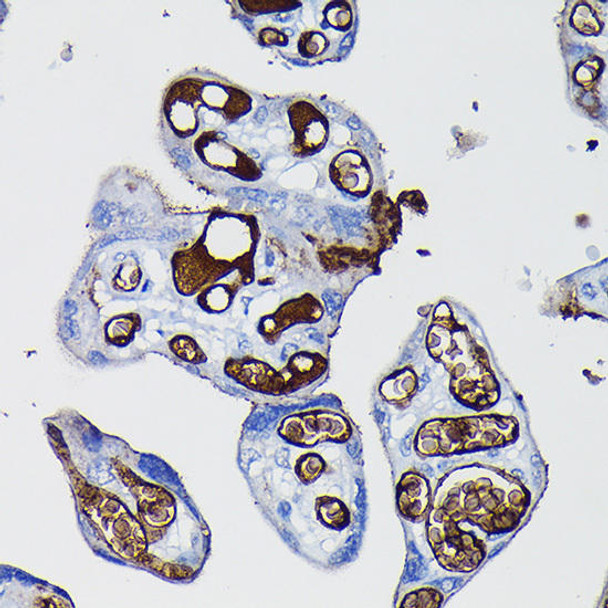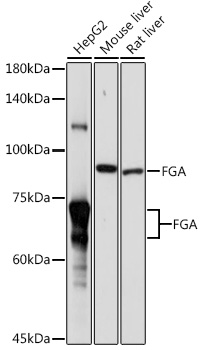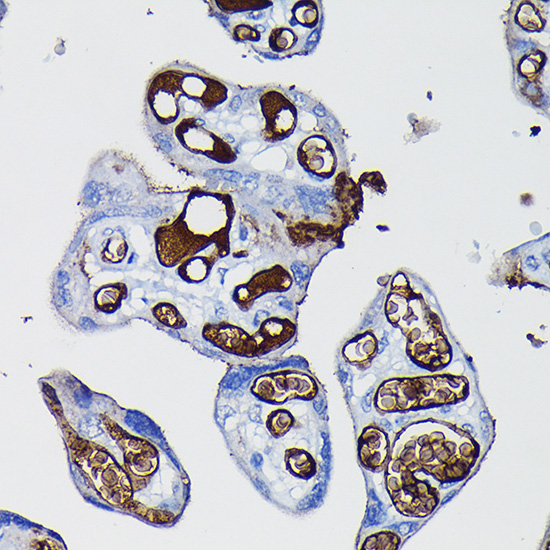Anti-FGA Antibody (CAB1453)
- SKU:
- CAB1453
- Product type:
- Antibody
- Reactivity:
- Human
- Mouse
- Rat
- Host Species:
- Rabbit
- Isotype:
- IgG
- Antibody Type:
- Polyclonal Antibody
- Research Area:
- Immunology
Description
| Antibody Name: | Anti-FGA Antibody |
| Antibody SKU: | CAB1453 |
| Antibody Size: | 20uL, 50uL, 100uL |
| Application: | WB IHC |
| Reactivity: | Human, Mouse, Rat |
| Host Species: | Rabbit |
| Immunogen: | A synthetic peptide corresponding to a sequence within amino acids 1-100 of human FGA (NP_068657.1). |
| Application: | WB IHC |
| Recommended Dilution: | WB 1:500 - 1:2000 IHC 1:50 - 1:200 |
| Reactivity: | Human, Mouse, Rat |
| Positive Samples: | HepG2, Mouse liver, Rat liver |
| Immunogen: | A synthetic peptide corresponding to a sequence within amino acids 1-100 of human FGA (NP_068657.1). |
| Purification Method: | Affinity purification |
| Storage Buffer: | Store at -20°C. Avoid freeze / thaw cycles. Buffer: PBS with 0.02% sodium azide, 50% glycerol, pH7.3. |
| Isotype: | IgG |
| Sequence: | VERH QSAC KDSD WPFC SDED WNYK CPSG CRMK GLID EVNQ DFTN RINK LKNS LFEY QKNN KDSH SLTT NIME ILRG DFSS ANNR DNTY NRVS EDLR SRIE VLKR KVIE KVQH IQLL QKNV RAQL VDMK RLEV DIDI KIRS CRGS CSRA LARE VDLK DYED QQKQ LEQV IAKD LLPS RDRQ HLPL IKMK PVPD LVPG NFKS QLQK VPPE WKAL TDMP QMRM ELER PGGN EITR GGST SYGT GSET ESPR NPSS AGSW NSGS SGPG STGN RNPG SSGT GGTA TWKP GSSG PGST GSWN SGSS |
| Gene ID: | 2243 |
| Uniprot: | P02671 |
| Cellular Location: | Secreted |
| Calculated MW: | 69kDa/94kDa |
| Observed MW: | 95KDa/60-70KDa |
| Synonyms: | FGA, Fib2 |
| Background: | This gene encodes the alpha subunit of the coagulation factor fibrinogen, which is a component of the blood clot. Following vascular injury, the encoded preproprotein is proteolytically processed by thrombin during the conversion of fibrinogen to fibrin. Mutations in this gene lead to several disorders, including dysfibrinogenemia, hypofibrinogenemia, afibrinogenemia and renal amyloidosis. Alternative splicing results in multiple transcript variants, at least one of which encodes an isoform that undergoes proteolytic processing. |
| UniProt Protein Function: | FGA: Fibrinogen has a double Function: yielding monomers that polymerize into fibrin and acting as a cofactor in platelet aggregation. Defects in FGA are a cause of congenital afibrinogenemia (CAFBN). This is a rare autosomal recessive disorder characterized by bleeding that varies from mild to severe and by complete absence or extremely low levels of plasma and platelet fibrinogen. The majority of cases of afibrinogenemia are due to truncating mutations. Variations in position Arg-35 (the site of cleavage of fibrinopeptide a by thrombin) leads to alpha- dysfibrinogenemias. Defects in FGA are a cause of amyloidosis type 8 (AMYL8); also known as systemic non-neuropathic amyloidosis or Ostertag-type amyloidosis. AMYL8 is a hereditary generalized amyloidosis due to deposition of apolipoprotein A1, fibrinogen and lysozyme amyloids. Viscera are particularly affected. There is no involvement of the nervous system. Clinical features include renal amyloidosis resulting in nephrotic syndrome, arterial hypertension, hepatosplenomegaly, cholestasis, petechial skin rash. 2 isoforms of the human protein are produced by alternative splicing. |
| UniProt Protein Details: | Protein type:Secreted; Secreted, signal peptide Chromosomal Location of Human Ortholog: 4q28 Cellular Component: extracellular space; cell surface; fibrinogen complex; plasma membrane; extracellular region; cell cortex; vesicle; external side of plasma membrane Molecular Function:protein binding, bridging; protein binding; cell adhesion molecule binding; structural molecule activity; receptor binding Biological Process: protein polymerization; platelet activation; extracellular matrix organization and biogenesis; positive regulation of heterotypic cell-cell adhesion; cell-matrix adhesion; signal transduction; cellular protein complex assembly; platelet degranulation; positive regulation of protein secretion; positive regulation of vasoconstriction; innate immune response; blood coagulation; response to calcium ion; positive regulation of exocytosis Disease: Amyloidosis, Familial Visceral; Afibrinogenemia, Congenital; Dysfibrinogenemia, Congenital |
| NCBI Summary: | The protein encoded by this gene is the alpha component of fibrinogen, a blood-borne glycoprotein comprised of three pairs of nonidentical polypeptide chains. Following vascular injury, fibrinogen is cleaved by thrombin to form fibrin which is the most abundant component of blood clots. In addition, various cleavage products of fibrinogen and fibrin regulate cell adhesion and spreading, display vasoconstrictor and chemotactic activities, and are mitogens for several cell types. Mutations in this gene lead to several disorders, including dysfibrinogenemia, hypofibrinogenemia, afibrinogenemia and renal amyloidosis. Alternative splicing results in two isoforms which vary in the carboxy-terminus. [provided by RefSeq, Jul 2008] |
| UniProt Code: | P02671 |
| NCBI GenInfo Identifier: | 1706799 |
| NCBI Gene ID: | 2243 |
| NCBI Accession: | P02671.2 |
| UniProt Secondary Accession: | P02671,Q4QQH7, Q9BX62, Q9UCH2, A8K3E4, D3DP14, D3DP15 |
| UniProt Related Accession: | P02671 |
| Molecular Weight: | 69,757 Da |
| NCBI Full Name: | Fibrinogen alpha chain |
| NCBI Synonym Full Names: | fibrinogen alpha chain |
| NCBI Official Symbol: | FGA |
| NCBI Official Synonym Symbols: | Fib2 |
| NCBI Protein Information: | fibrinogen alpha chain; fibrinogen, A alpha polypeptide |
| UniProt Protein Name: | Fibrinogen alpha chain |
| Protein Family: | Fibrinogen |
| UniProt Gene Name: | FGA |
| UniProt Entry Name: | FIBA_HUMAN |






![Anti-GSS Antibody (CAB14535)[KO Validated] Anti-GSS Antibody (CAB14535)[KO Validated]](https://cdn11.bigcommerce.com/s-39x6lpnvxv/images/stencil/590x590/products/28191/26380/anti-gss-antibody-cab14535ko-validated__06344__41534.1644315879.jpg?c=1)


